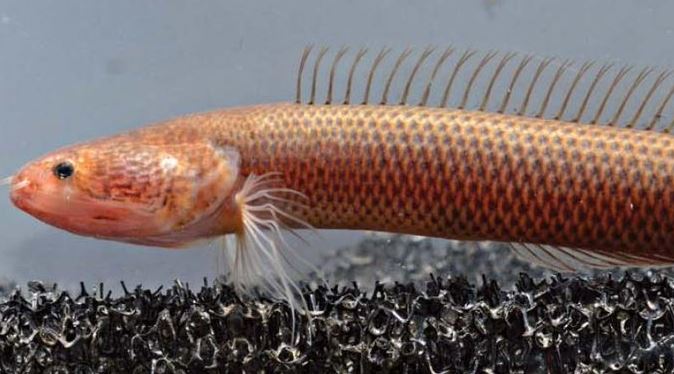A new freshwater fish species has been discovered in Kerala, a state blessed with freshwater resources, scientists said here.
This fish belonging to the subterranean snakehead species was found in the well of a house in Thiruvalla in Pathanamthitta district last year, they said Sunday.
The newly discovered fish, a cousin of the well-known ‘varaal’ and ‘cher meen’, is characterised by an elongated body, small size, a very large mouth, and most remarkably, the fin rays of the pectoral fin being greatly elongated as filamentous extensions.
It is hypothesised that these extensions may be sensory in nature and used by the fish to find its way in the dark by touch.
Researchers at the Peninsular and Marine Fish Genetic Resources Centre ofICAR-National Bureau of Fish Genetic Resources (ICAR-NBFGR) here have described the species as Aenigmachanna Mahabali.
The fish was collected by Arun Vishwanath, a native of Thiruvalla from the well in his house in April, 2018.
The discovery of this species comes on the heels of Aenigmachanna Gollum, found earlier this year from Malappuram district.
It is remarkable that two species of Aenigmachanna have been discovered almost simultaneously, with a distance of over 200km separating them.
Rahul G Kumar, a researcher with NBFGR who discovered the species, said nearly 250 species of fish are known from subterranean habitats across the world, with more being added to the list every year.
Some of these species have been discovered by explorers visiting underground caverns, but many have been accidentally discovered when wells are dug or cleaned, he said.
Researchers opined that Kerala is blessed with a variety of freshwater resources which are home to over 300 species of fish, about a third of which are endemic to the region.
At the same time an equally varied and wonderful ecosystem exists, unrecognised and out of sight, in the extensive water bodies that lie below the ground, they said.
In India, Kerala is an undisputed hotspot of subterranean fish diversity, with nine species known mostly from central Kerala in Pathanamthitta, Kottayam, Ernakulam and Thrissur districts.
“These subterranean fish species are characterised, for the most part, by adaptations which include a small adult size, red colour due to blood vessels near the skin, and reduced eyes and fins,” they said.
According to Rahul, the discovery of fish, as well as crustaceans and other life forms, from subterranean waters is a reminder of the vast diversity of life which still remains to be discovered, studied and understood.
“The presence of fish and crustaceans in groundwater is usually an indicator of good water quality which can sustain life and residents have nothing to worry about over the discovery of these animals in their household wells,” he said.
He said in fact given the rarity of specimens, people were encouraged to inform researchers when they encounter such life forms, as very little is known about the ecology and biology of subterranean waters and every little piece of information is useful.
“Groundwater resources across the world are being fast depleted, both by extraction and by pollution, and it is imperative that we implement measures to study and conserve these resources, both for the use of future generations and for the sake of the life that exists there, Rahul added.





